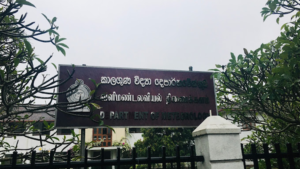Physical Address
23,24,25 & 26, 2nd Floor, Software Technology Park India, Opp: Garware Stadium,MIDC, Chikalthana, Aurangabad, Maharashtra – 431001 India
Physical Address
23,24,25 & 26, 2nd Floor, Software Technology Park India, Opp: Garware Stadium,MIDC, Chikalthana, Aurangabad, Maharashtra – 431001 India

The Climate Fact Checks research team participated in the world meteorological day national celebration at the meteorological department of Sri Lanka on March 23rd. It is celebrated to memorize the establishment of the World Meteorological Organization (WMO) on March 1950. World Meteorological Day 2023 focused on the theme, ‘The Future of Weather, Climate and Water across Generations’.
The event started with the arrival of the chief guest, the state minister of defense, Hon.Premitha Bandara Tennakoon. Other guests included meteorologists, former weather scientists, and researchers.
Welcome and Keynote speech
Director General of the meteorological department A.K.Aththanayake gave the keynote address. He explained that since Sri Lanka is a country close to the equator, the weather changes very quickly. Therefore, a technologically advanced system is needed to calculate weather data. Through the help of the Japanese government, Sri Lanka will soon receive a “Doppler Radar System,” he added. Doppler radar is a specialized tracking system that uses the Doppler effect (Doppler shift) to determine the location and velocity of storms and precipitation. Doppler radar has been one of the most significant technological advances in hazardous weather prediction. Forecasters using Doppler radar can issue more timely and accurate hazardous weather information than before. He pointed out that the weather data can be calculated and given to the citizens before the clouds even fall. He said Sri Lanka was supposed to receive two radar systems, but now we can afford only one due to the economic recession.
Message of WMO Secretary General, Professor, Pettari Taalas
The WMO secretary-general, Pettari Taalas, gave a very interesting speech. He said that WMO analyzes weather data according to a scientific procedure and works on climate disaster prediction with experts and climate scientists. He added that extreme weather events happen so rapidly these days since the World Meteorological Congress targets more resilient weather and climate systems. COP 27 focused on the Executive Action Plan for the Early Warnings for all initiative calls. The investments made between 2023 and 2027 of US$ 3.1 billion, where the benefits would dwarf. This amount is a small fraction (about 6%) of the requested US$ 50 billion in adaptation financing. It would cover disaster risk knowledge, observations and forecasting, preparedness and response, and communication of early warnings. The early warning system works in both developed and developing countries. However, underdeveloped countries also have a strong need for this system. For that reason, we want to draw attention to the climate financing on early warning systems of every nation, Professor Petteri Talaas concluded.
Speeches given by chief guests
In the speech by the Secretary of the Ministry of Defense, General (Retd.) Kamal Gunarathna stated that people adjusted their lives to accommodate natural disasters after the tsunami hit Sri Lanka in 2004. However, there are no challenges easy to tackle for the survival of the world! The government, forces, and all disaster service centers stand by every disaster condition as one unit to assist vulnerable people. Then The Minister, Hon.Premitha Bandara Tennakoon, also stated “the importance of funding allocation for disaster mitigation.”
Mr. K.D. Sujeewa, the Deputy Director of the Meteorological Department, delivered a fascinating lecture on “The future of weather, climate, and water across generations” He also addressed the impact on biosystems and climate due to environmental damages such as deforestation and sand dumping. Also, it is detrimental that the country continues with development projects without conducting proper environmental impact assessments like the Kalu Ganga water pumping station he highlighted.
Takeaways from the event.
The Climate Fact Checks team created countless networks with professionals in the field of meteorology. We also interviewed meteorological scientists and experts who shared very valuable knowledge and insight on the topic. They were also very eager to impart knowledge to us. We are so grateful for that opportunity and the fact that they appreciated our research work. We also hope to work with them and engage in related research activities. We also got views on climate change from the school students who attended the event. Accordingly, we recognized the need to educate school children about climate change and invited them to our awareness programs. You will soon be able to read more interesting articles based on the knowledge gained from this program and the specialists we have contacted.